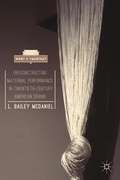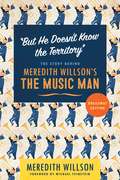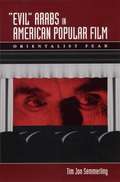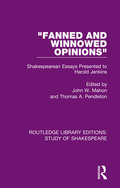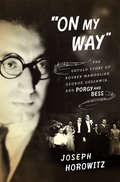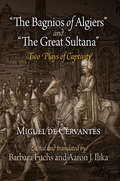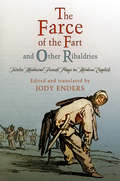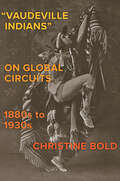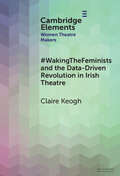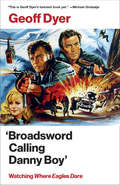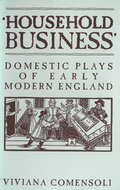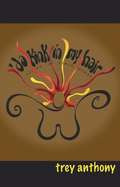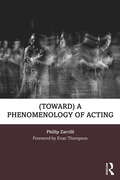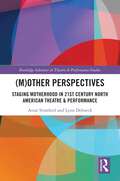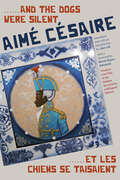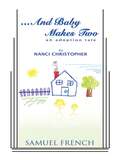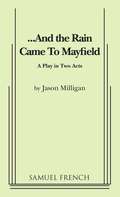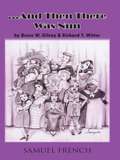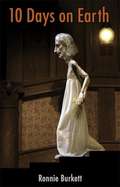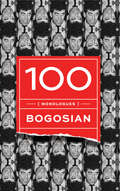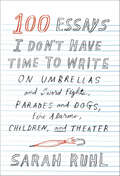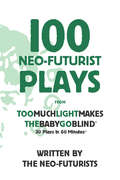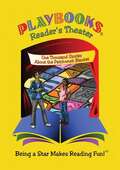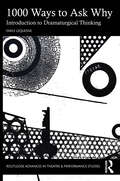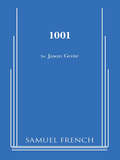- Table View
- List View
(What is Theatre?)
by L. Bailey McDanielLooking at a century of American theatre, McDaniel investigates how race-based notions of maternal performance become sites of resistance to cultural and political hierarchies. This book considers how the construction of mothering as universally women's work obscures additional, equally constructed subdivisions based in race and class.
"But He Doesn't Know the Territory": The Story behind Meredith Willson's The Music Man
by Meredith WillsonChronicles the creation of Meredith Willson&’s The Music Man—reprinted now as the Broadway Edition Composer Meredith Willson described The Music Man as &“an Iowan&’s attempt to pay tribute to his home state.&” Now featuring a new foreword by noted singer and educator Michael Feinstein, this book presents Willson&’s reflections on the ups and downs, surprises and disappointments, and finally successes of making one of America&’s most popular musicals. Willson&’s whimsical, personable writing style brings readers back in time with him to the 1950s to experience firsthand the exciting trials and tribulations of creating a Broadway masterpiece. Fresh admiration of the musical—and the man behind the music—is sure to result.
"Evil" Arabs in American Popular Film: Orientalist Fear
by Tim Jon SemmerlingLooking at their narrative structures and visual tropes, he analyzes how the films portray Arabs as threatening to subvert American "truths" and mythic tales—and how the insecurity this engenders causes Americans to project evil character and intentions on Arab peoples, landscapes, and cultures. Semmerling also demonstrates how the "evil" Arab narrative has even crept into the documentary coverage of 9/11. Overall, Semmerling's probing analysis of America's Orientalist fears exposes how the "evil" Arab of American popular film is actually an illusion that reveals more about Americans than Arabs.
"Fanned and Winnowed Opinions": Shakespearean Essays Presented to Harold Jenkins (Routledge Library Editions: Study of Shakespeare)
by John W. Mahon and Thomas A. PendletonOriginally published in 1987, "Fanned and Winnowed Opinions" celebrates the scholarship of Professor Harold Jenkins, one of this century’s foremost editors and critics of Shakespeare. All of the essays address Shakespearean topics, and many of the sixteen focus on the years between 1595 and 1605, the period on which much of Professor Jenkin’s work centers: there are, appropriately, three essays on Hamlet. A variety of critical approaches is represented, including the Freudian and the feminist; some essays focus on one play, while others take a thematic approach. Comedies, histories, and tragedies all come under consideration. The contributors include many distinguished scholars, some of whom studied under Professor Jenkins or edited volumes of the Arden Shakespeare under his direction. All of the contributions were specifically written for the Festschrift and had not appeared in print before. In addition to the scholarly essays, the volume features an introduction with an appreciative review of Harold Jenkins’ career and a complete bibliography of his works.
"On My Way": The Untold Story of Rouben Mamoulian, George Gershwin, and Porgy and Bess
by Joseph HorowitzA revelatory history of the operatic masterpiece that both made and destroyed Rouben Mamoulian, its director and unsung hero. "Bring my goat!" Porgy exclaims in the final scene of Gershwin's opera Porgy and Bess. Bess, whom he loves, has left for New York City, and he's determined to find her. When his request is met with astonishment--New York is a great distance from South Carolina's Catfish Row--Porgy remains undaunted. He mounts his goat-cart and leads the community in an ecstatic finale, "Oh Lawd, I'm on my way." Stephen Sondheim has called "Bring my goat!" "one of the most moving moments in musical theater history." For years it was assumed that DuBose Heyward--the author of the seminal novella and subsequent play, Porgy, and later the librettist for the opera Porgy and Bess--penned this historic line. In fact, both it and "Oh Lawd, I'm on my way" were added to the play eight years earlier by that production's unheralded architect: Rouben Mamoulian. Porgy and Bess as we know it would not exist without the contributions of this master director. Culling new information from the recently opened Mamoulian Archives at the Library of Congress, award-winning author Joseph Horowitz shows that, more than anyone else, Mamoulian took Heyward's vignette of a regional African-American subculture and transformed it into an epic theater work, a universal parable of suffering and redemption. Part biography, part revelatory history, "On My Way" re-creates Mamoulian's visionary style on stage and screen, his collaboration with George Gershwin, and the genesis of the opera that changed the face of American musical life.
"The Bagnios of Algiers" and "The Great Sultana"
by Miguel De Cervantes Barbara Fuchs Aaron J. IlikaBest known today as the author of Don Quixote--one of the most beloved and widely read novels in the Western tradition--Miguel de Cervantes Saavedra (1547-1616) was a poet and a playwright as well. After some early successes on the Madrid stage in the 1580s, his theatrical career was interrupted by other literary efforts. Yet, eager to prove himself as a playwright, shortly before his death he published a collection of his later plays before they were ever performed.With their depiction of captives in North Africa and at the Ottoman court, two of these, "The Bagnios of Algiers" and "The Great Sultana," draw heavily on Cervantes's own experiences as a captive, and echo important episodes in Don Quixote. They are set in a Mediterranean world where Spain and its Muslim neighbors clashed repeatedly while still remaining in close contact, with merchants, exiles, captives, soldiers, and renegades frequently crossing between the two sides. The plays provide revealing insights into Spain's complex perception of the world of Mediterranean Islam.Despite their considerable literary and historical interest, these two plays have never before been translated into English. This edition presents them along with an introductory essay that places them in the context of Cervantes's drama, the early modern stage, and the political and cultural relations between Christianity and Islam in the early modern period.
"The Farce of the Fart" and Other Ribaldries
by Jody EndersWas there more to medieval and Renaissance comedy than Chaucer and Shakespeare? Bien sûr. For a real taste of saucy early European humor, one must cross the Channel to France. There, in the fifteenth and early sixteenth centuries, the sophisticated met the scatological in popular performances presented by roving troupes in public squares that skewered sex, politics, and religion. For centuries, the scripts for these outrageous, anonymously written shows were available only in French editions gathered from scattered print and manuscript sources. Now prize-winning theater historian Jody Enders brings twelve of the funniest of these farces to contemporary English-speaking audiences in "The Farce of the Fart" and Other Ribaldries. Enders's translation captures the full richness of the colorful characters, irreverent humor, and over-the-top plotlines, all in a refreshingly uncensored American vernacular.Those who have never heard the one about the Cobbler, the Monk, the Wife, and the Gatekeeper should prepare to be shocked and entertained. "The Farce of the Fart" and Other Ribaldries is populated by hilarious characters high and low. For medievalists, theater practitioners, and classic comedy lovers alike, Enders provides a wealth of information about the plays and their history. Helpful details abound for each play about plot, character development, sets, staging, costumes, and props. This performance-friendly collection offers in-depth guidance to actors, directors, dramaturges, teachers, and their students."The Farce of the Fart" and Other Ribaldries puts fifteenth-century French farce in its rightful place alongside Chaucer, Shakespeare, commedia dell'arte, and Molière--not to mention Monty Python. Vive la Farce!
"Vaudeville Indians" on Global Circuits, 1880s-1930s (The Henry Roe Cloud Series on American Indians and Modernity)
by Christine BoldUncovering hidden histories of Indigenous performers in vaudeville and in the creation of western modernity and popular culture Drawing from little-known archives, Christine Bold brings to light forgotten histories of Indigenous performers in vaudeville and, by extension, popular culture and modernity. Vaudeville was both a forerunner of modern mass entertainment and a rich site of popular Indigenous performance and notions of Indianness at the turn of the twentieth century. Tracing the stories of artists Native to Turtle Island (North America) performing across the continent and around the world, Bold illustrates a network of more than 300 Indigenous and Indigenous-identifying entertainers, from Will Rogers to Go-won-go Mohawk to Princess Chinquilla, who upend vaudeville&’s received history. These fascinating stories cumulatively reveal vaudeville as a space in which the making of western modernity both denied and relied on living Indigenous presence, and in which Indigenous artists negotiated agency and stereotypes through vaudeville performance.
#WakingTheFeminists and the Data-Driven Revolution in Irish Theatre (Elements in Women Theatre Makers)
by Claire Keogh#WakingTheFeminists was a year-long grassroots campaign for gender equality in Irish theatre. Prompted by the gender disparity of Ireland's Abbey Theatre's 2016 programme, 'Waking the Nation', Lian Bell posted a Facebook message that sparked a surge of feminist fury that ignited the #WakingTheFeminists movement. This Element considers the movement both as digital feminist activism and as part of the growing trend of data feminism, by analysing how its combined use of connective and collective action, and qualitative and quantitative data, was critical to its success. It contextualises the movement historically in relation to a series of feminist controversies in Irish theatre since 1990, before considering its impact on both policy and cultural changes across the Irish arts sector. #WakingTheFeminists' national and international resonance derived from its research-informed strategy which made it the most effective campaign for gender equality in the history of Irish theatre.
'Broadsword Calling Danny Boy': Watching 'Where Eagles Dare'
by Geoff DyerGeoff Dyer's earlier book on film, Zona, was about Andrei Tarkovsky's Stalker, so it was perhaps inevitable that he should next devote his unique critical and stylistic energies to Brian G. Hutton's Where Eagles Dare. A thrilling Alpine adventure starring a magnificent, bleary-eyed Richard Burton and a dynamically lethargic Clint Eastwood, Where Eagles Dare is the apex of 1960s war movies, by turns enjoyable and preposterous.'Broadsword Calling Danny Boy' is Geoff Dyer's hilarious tribute to a film he has loved since childhood: it's a scene-by-scene analysis—or should that be send-up?—taking us from it's snowy, Teutonic opening credits to its vertigo-inducing climax.
'Household Business'
by Viviana ComensoliThe domestic play flourished on the English popular stage during the late sixteenth and early seventeenth centuries. Its roots were predominantly native, rather than classical, and its mainspring was the staging of domestic conflict amongst English characters from the middle ranks of society. Household Business traces the genre's origins in the cycle plays of medieval England and examines its aesthetic configurations in relation to extra-literary discourses and practices that underwrote Renaissance ideologies of private life. At a time when the orthodox view of the family defined it as the foundation of the social order, a number of domestic dramas took a more critical perspective, stressing the contradictions and struggles that attend marriage and the patriarchal family.In addition to well-known domestic dramas as A Woman Killed with Kindness, Arden of Feversham, The Witch of Edmonton, and A Yorkshire Tragedy, Viviana Comensoli analyzes less well-studied plays as A Warning for Fair Women, Two Lamentable Tragedies, and The Late Lancashire Witches. The book also provides an extensive and timely assessment of domestic comedy, demonstrating how plays such as The London Prodigal, The Fair Maid of Bristow, and The Honest Whore (Parts I and II) resist homiletic paradigms in favour of a more dialectical dramaturgy.
'da Kink in my hair: Voices of Black Womyn
by Trey AnthonySet in a West Indian hair salon in Toronto, da Kink in my hair gives voice to a group of women who tell us their unforgettable, moving, and often hilarious stories. Mixing laughter and tears—and told in words, music, and dance—the stories explore the hardship, struggles, and joys of black women's lives.
(toward) a phenomenology of acting
by Phillip ZarrilliIn (toward) a phenomenology of acting, Phillip Zarrilli considers acting as a ‘question’ to be explored in the studio and then reflected upon. This book is a vital response to Jerzy Grotowski’s essential question: "How does the actor ‘touch that which is untouchable?’" Phenomenology invites us to listen to "the things themselves", to be attentive to how we sensorially, kinesthetically, and affectively engage with acting as a phenomenon and process. Using detailed first-person accounts of acting across a variety of dramaturgies and performances from Beckett to newly co-created performances to realism, it provides an account of how we ‘do’ or practice phenomenology when training, performing, directing, or teaching. Zarrilli brings a wealth of international and intercultural experience as a director, performer, and teacher to this major new contribution both to the practices of acting and to how we can reflect in depth on those practices. An advanced study for actors, directors, and teachers of acting that is ideal for both the training/rehearsal studio and research, (toward) a phenomenology of acting is an exciting move forward in the philosophical understanding of acting as an embodied practice.
**Missing**: Staging Motherhood in 21st Century North American Theatre & Performance (Routledge Advances in Theatre & Performance Studies)
by Aoise StratfordThis anthology examines maternity in contemporary performance at the intersection of a wide range of topics from nationhood to mental health, queer parenting, embodied dramaturgy, cultural practice, and immigration. Across the breadth of these themes, we interrogate the cultural implications and politics of how we script, perform, receive, and define mothers, challenging many of the normalizing and patriarchal tropes associated with the mother-as-character. This book includes critical essays examining twenty-first century dramatic literature, first-hand ethnographic accounts of motherhood in practice, interviews, feminist manifestos, and artist reflections. In its deliberately curated variety, this collection seeks to resist homogeneity and offer instead a range of approaches to key questions: what versions of motherhood get staged, and why? And how do dramatic representations tell us about the role of mothers in our own fraught contemporary moment? This collection will be of great interest to those in academia who are teaching, researching, or studying in the fields of Theatre and Performance Studies, American Studies, and Feminist and Gender Studies.
......And the Dogs Were Silent/......Et les chiens se taisaient
by Aimé CésaireAvailable to readers for the first time, Aimé Césaire’s three-act drama . . . . . . And the Dogs Were Silent—written during the Vichy regime in Martinique in 1943 and lost until 2008—dramatizes the Haitian Revolution and the rise and fall of Toussaint Louverture as its heroic leader. This bilingual English and French edition stands apart from Césaire’s more widely known 1946 closet drama. Following the slave revolts that sparked the revolution, Louverture arrives as both prophet and poet, general and visionary. With striking dramatic technique, Césaire retells the revolution in poignant encounters between rebels and colonial forces, guided by a prophetic chorus and Louverture’s steady ethical and political vision. In the last act, we reach the hero’s betrayal, his imprisonment, and his last stand against the lures of compromise. Césaire’s masterwork is a strikingly beautiful and brutal indictment of colonial cruelty and an unabashed celebration of Black rebellion and victory.
...And Baby Makes Two
by Nanci ChristopherCharacters: 1 femaleA single woman's desire to experience motherhood without a husband at her side sends her through the world of adoption. Her path leads her through an array of characters and situations rife with drama. Settling on private adoption through an attorney she suffers an unfathomable heartbreak at the death of her newborn son. She is somehow able to rise out of despair to try again and meets Elizabeth who is looking for someone to adopt her unborn child. A new family is forged through the courage of two very brave women. The running time is one hour."Christopher's messages about love and following your dreams are worth telling...fascinating material." - Backstage West...And Baby Makes Two - an adoption tale was nominated for the 2009 SUSAN SMITH BLACKBURN PRIZE.
...And Rain Came to Mayfield
by Jason MilliganA poetic family drama, this play takes place in a small gas station/luncheonette on a Mississippi highway in 1962. The owner's son Carl dreams of going to college but his alcoholic father does not support these aspirations and his mother referees a desperate tug of war between the them. One afternoon, a young black man appears in the doorway seeking shelter while he waits for the bus to Jackson. On this Mississippi day, the two young men discover that they share a need to establish their independence and follow thier dreams. Carl's father reacts violently when he finds the black man in his establishment, but Carl stands up to his father for the first time in his life.
...And The There Was Nun
by Bruce W. GilrayComedy with Music / 11 characters (m or f) ...And Then There Was Nun is written in the style of a classic 1940's murder mystery; and is a blend of humor and who-dun-it as the actors emulate iconic movie stars of the past. Take one foreboding mansion on a secluded island, throw in ten whacked-out members of The Holy Order of the Sisters of San Andreas, stir in their unseen and mysterious leader, add an assortment of the sharpest tongues this side of Hollywood and Vine; then infuse with a healthy dose of some of the most famous lines in cinema (slightly warped). Roast well in a preheated treasure trove of movie facts, trivia, legends and gossip for two acts, sit back and savor. ...And Then There Was Nunis a treat for movie buffs and non-movie buffs alike. Actors who take on the personas parodied in this play will be creatively challenged to mold their performances with the mannerisms and vocal styles of famous actors of the past, having an amazingly fun experience along the way. ...And Then There Was Nun was the winner of the 1990 "Robby" Award for "Best Comedy Production" and for "Best Actor" - Tif Rice as Sister Katharine. "...a gas...over the top and as thick as the North Pasture. Needless to add, the audience loved every single second of it." -Drama-Logue "...the nun's story to end all nun's stories...leagues above most comedies and the laughs come nonstop..." -Frontiers "...a captivating mystery...Bruce Gilray and Richard Witter ... created a work that's a joy for actors." -The Press Telegram "...what more could a movie buff desire? A killer evening of hilarity." -The Daily Breeze "Plan a social evening with friends and buy a group of tickets for one of the funniest and entertaining evenings on the current theatre scene in Los Angeles" -The Tolucan
10 Days on Earth
by Ronnie BurkettHe lived alone with very little and more than enough, and preferred it that way. "Simply simply," he was oft heard to say. He was alone, on his own, and that was okay... Darrel is a middle-aged intellectually challenged man who lives with his mother. When she dies in her sleep, Darrel does not realize she is gone, and so, for over a week, he lives alone. Tandem to Darrel's day-to-day routine are the adventures of his favourite children's book characters, Honeydog and Little Burp. Their search for a home leads the dog and duck duo to an understanding of family, while Darrel's ease in the world illustrates just how his mother has paved the path for him to be without her. Episodes from the past, like faded colour snapshots from a family album, illustrate this mother's love for her son in all its honesty and fierce, unwavering will. Simple, tender, funny and unapologetic, 10 Days On Earth asks: If you were alone but didn't know it, would you feel lonely?
100 (monologues)
by Eric BogosianThis new collection by one of America's premier performers and most innovative and provocative artists includes 100 monologues from his acclaimed plays and solo shows including: Drinking in America; Men Inside; Pounding Nails in the Floor with My Forehead; Sex, Drugs, Rock & Roll and more. Also included are additional pieces from Talk Radio and Notes from Underground.
100 Essays I Don't Have Time to Write: On Umbrellas and Sword Fights, Parades and Dogs, Fire Alarms, Children, and Theater
by Sarah Ruhl100 Essays I Don't Have Time to Write is an incisive, idiosyncratic collection on life and theater from major American playwright Sarah Ruhl. This is a book in which chimpanzees, Chekhov, and child care are equally at home. A vibrant, provocative examination of the possibilities of the theater, it is also a map to a very particular artistic sensibility, and an unexpected guide for anyone who has chosen an artist's life. Sarah Ruhl is a mother of three and one of America's best-known playwrights. She has written a stunningly original book of essays whose concerns range from the most minimal and personal subjects to the most encompassing matters of art and culture. The titles themselves speak to the volume's uniqueness: "On lice," "On sleeping in the theater," "On motherhood and stools (the furniture kind)," "Greek masks and Bell's palsy."
100 Neo-Futurist Plays
by The Neo-FuturistsThis collection of 100 short (very short) plays from The Neo-Futurists' acclaimed cult hit Too Much Light Makes the Baby Go Blind was originally published by Chicago Plays in 1993. The show presents 30 plays in 60 minutes, its ensemble of writer/performers generating between two and 12 new plays each week, as dictated by a roll of the dice. The material runs the gamut of style, tone, and topic: musical, confession, agit-prop, poetic gesture, physical comedy, puppet theater, audience interrogation, folk song, sex joke, and many more. The plays are funny, moving, challenging, powerful, and occasionally just plain weird. There is no fourth wall in Too Much Light Makes the Baby Go Blind - the show embraces the ideal that theater is created in the connection between audience and performer. Randomness, dynamism, speed, brevity, and planned obsolescence are celebrated and exploited to engage and refresh all participants. The plays stand as an entertaining document of the show's output, and they are ideal for scene study, auditions, and competitions.
1000 Stories About the Patchwork Blanket
by Ariana Espiritu Dianna ClevelandA Playbook® Multi-colored and Multi-leveled Role-play Reading Story / Script, A Playbook® Multi-colored and Multi-leveled Role-play Reading Story / Script ,A Playbook® Multi-colored and Multi-leveled Role-play Reading Story / Script
1000 Ways to Ask Why: Introduction to Dramaturgical Thinking (Routledge Advances in Theatre & Performance Studies)
by Emily LeQuesneWhat is dramaturgy? Can you be taught how to do it?1000 Ways to Ask Why is a practical how-to guide and introduction to dramaturgy and dramaturgical thinking for dramaturgs, directors, playwrights, devised theatre makers, choreographers, and performers.This book introduces The Mosaic Scale process, a five-step system that can be dipped in and out of, as the steps don’t have to be read in a linear way. Akin to a mosaic-building approach, it is designed to help theatre makers refine and develop the bigger picture of a script or a piece of devised performance. Until now, there has been no formal technique for literary or process dramaturgy. This step-by-step process for applying dramaturgical thinking is a series of questions, exercises, and considerations to ask throughout the process of theatre making and rehearsal. The first how-to literary and process dramaturgy guide. Full of practical exercises, questions, and ways to approach dramaturgical thinking. Accessible exploration of a subject that can sometimes be inaccessibly academic. This volume will be of great interest to students and dramaturgs.
1001
by Jason Grote4m, 2f to play multiple roles / Dramatic Comedy The cuckolded King Shahriyar is marrying a new bride every night and beheading her the next morning. As unrest spreads in the Sultanate, his vizier's daughter Scheherezade hatches a plan: she will offer herself as a bride and seduce the king with stories that leave him hanging on every word. She weaves such tales as "Sindbad the Sailor" and "Alaeddin and His Magic Lamp" with stories of Borges, Flaubert, and Alan and Dahna -- a Jewish man and an Arab woman who have fallen in love in millennial New York City. Shahriyar becomes Alan and Scheherezade becomes Dahna as the worlds mingle and inform one another. Modern speech invades the fantasy tales, and swords and genii appear in the 21st Century, in a dance of cultures and people who are forever intertwined. "[An] explosive, often brilliant work about America, narrative, the Middle East and identity."- Time Out New York "...funny, moving, postmodernist-in-a-good-way... Like Scheherazade's tales, 1001 is endlessly compelling, and also endless (again, in a good way)..."- Boston Globe "Jason Grote is one of a generation of brainy new American dramatists - including Tracy Letts and Will Eno - who understand that to reach new audiences, political theater needs to move beyond moral indignation and outrage, past spoon-feeding an attitude. One key to going forward is looking backward into literature, fable and allegory." - LA Weekly "...a wild and beautiful glimpse at the yarns that shape our lives...Even if it isn't always true, the story we keep telling -- about the power of love, violence, and death -- is a comfort. Grote tackles that concept with gripping imagination, achieving a cosmic scope by eliminating the barriers between worlds." - Variety "Grote's Orientalist fantasia...conjures a storybook world that dissolves, at a moment's notice, into an apocalyptic, 21st-century landscape. Where to begin to describe this seductive if smartalecky, nonlinear play? ...[ 1001] doesn't preach, and it doesn't underestimate the audience's intelligence." - Washington Post
